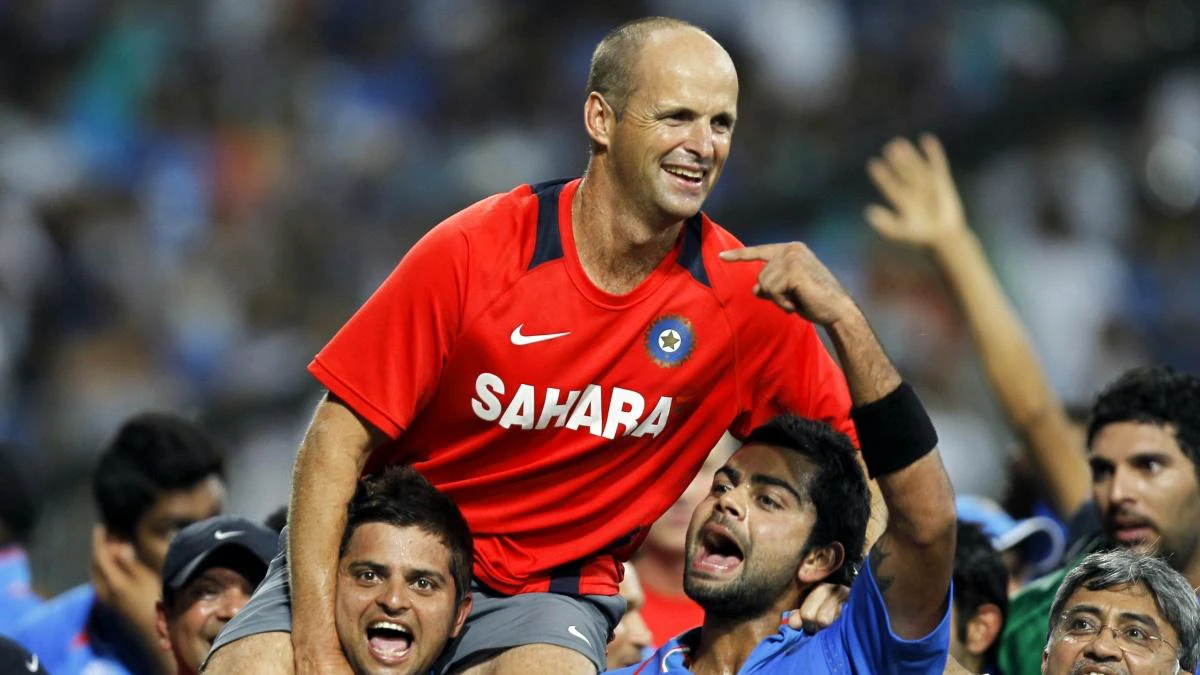‘I have a deep affection for Indian cricket. If someone asked me to come back, I wouldn’t say no.’
IMAGE: Suresh Raina and Virat Kohli carry Coach Gary Kirsten after India won the World Cup against Sri Lanka, April 2, 2011. Photograph: Adnan Abidi/Reuters
Gary Kirsten served as head coach of the Indian cricket team from 2008 to 2011, a period widely regarded as one of the most successful in Indian cricket history.
Under his calm and player-focused leadership, India rose to the No. 1 position in Test rankings and won the World Cup in 2011 after 28 years.
“I’ve had a lot of privilege from leading the 2011 Indian team. Indian cricket has been really good to my life,” Gary Kirsten tells Faisal Shariff in the first part of an exclusive multi-part interview.
Hello, and welcome to a very special episode of Sports and Pastime. We have a very special guest today.
A man all of India loves and is thankful for helping us win the 2011 World Cup, a legendary batsman from South Africa, one of the finest coaches in the world.
Ladies and gentlemen, Gary Kirsten. Thank you, Gary. Thank you for your time.
Well, Gary, I have so much to ask you about coaching, about your experiences, but I’m going to first talk about that one, one win that has meant so much to the world of cricket, to Test cricket and to South Africa.
So firstly, congratulations on the great World Test Championship win for South Africa. What did it mean to you and what do you think it means for the South African people to be able to win that after so many close misses and having had such great players, great runs, but never being able to get the silverware?
Relief more than anything else, to be honest with you although we have won the Mace before. That was in 2000 and 2012, I think. But this was a final, it was kind of what would be a knockout, isn’t it? In a World Cup event.
So from a South African cricket context, massive.
For me personally, more just a hundred Test match veteran to see us play such good Test match cricket in a one-off game against the best opposition that’s out there.
That was particularly exciting for me to watch. I haven’t watched much Test cricket to be honest. To be present at the game and watch ball by ball. I was blown away by Aiden Markham.
I watched every ball and it was most enjoyable to see one of our players in such control of this game, and again some of the best bowlers in the world.
So it was great to be present and just to be part of what was a fantastic experience for South African cricket.
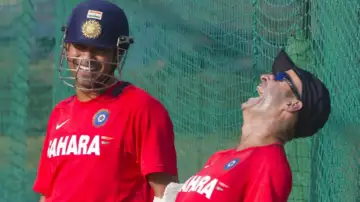
IMAGE: Sachin Tendulkar and Gary Kirsten in the nets ahead of the 2011 World Cup semi-final. Photograph: Vivek Prakash/Reuters
As someone who’s worked with captains, a word on South Africa’s captain Temba Bavuma who made all this happen, the way he rallied his troops together.
Bavuma is inspirational in many ways. You would know that we have had a very successful rugby team, the Springboks, and that’s led by an inspirational black captain in Siya Kolisi.
There’s always been a lot of talk around the Springboks rugby team, but just for a moment in time, and for once, a change of sports, and we could celebrate a black captain, which is massive again in the context of our country.
Rallying his troops together to bring success for everyone who loves the game of cricket. And the one thing I love about sports is that sports don’t divide people.
It brings people together. So it doesn’t matter from what part of the world you are from, if you’re struggling in life or if things are going well for you, when we all come together in the name of sport.
We seem to join as one, and there’s a common language that we all share and I think that’s amazing about sports.
So it was wonderful to have our summer national sport in South Africa receiving a bit of heart and everyone rallying behind them, which was great to see.
Truly, it was great for Test cricket, and also the numbers look very good. The broadcasters are smiling all the way to the bank because a lot of people watched it. The numbers are phenomenal on digital as well as on television, so that’s great for Test cricket.
But, having spoken about that, Gary, I want to talk to you about coaching and what a wonderful career you’ve had as a coach. A phenomenal career as an opening batsman for South Africa.
But tell me about coaching. I find it very interesting that you are coaching coaches, preparing them to improve the games of cricketers around the world.
It’s probably moving into a third phase of my working career. I was a player for 17 years professionally.
I’ve been on the road as a team coach now for the last, I don’t know, 20-odd years. I’m particularly passionate about coach education.
I think a quality coach can make such a difference on a young person’s career, and equally, a bad coach can have such a detrimental effect on a young player’s career.
So I love the idea of coaches becoming more skilled in their work. I love the fact that they would embrace learning and looking at ways of doing things that are appropriate to, you know the modern generation of people.
When I was a youngster growing up, the only way I could learn was through sitting in change rooms and listening to ex-players and older players still playing the game, learning from them how to play.
But these days, a 15 year old can go to YouTube and download anything that he wants to download and learn as much about the technique of playing the cover drive. So it requires a different style of coaching.
I think in many ways, a different way of communicating with people. And that’s why, coach education is so dear to me.
About five years ago we built four courses on the Coached platform, cricket.com. And the intention was to give access to coach education for many who wouldn’t be able to get it.
In the testimonials that we’ve got from the many coaches that completed these courses, the common denominator is, ‘I didn’t know that. I didn’t know that.’ ‘That’s the way you’ve got to talk to people.’ ‘I didn’t know that’s how you should run a team meeting.’ ‘I didn’t know those drills and fielding drills.’
It’s this access to knowledge, which I’m so passionate about because a lot of people out there who love the game of cricket, they want to coach, but they don’t necessarily know how to coach effectively. And that was the intention of the founding of Coached five years ago.
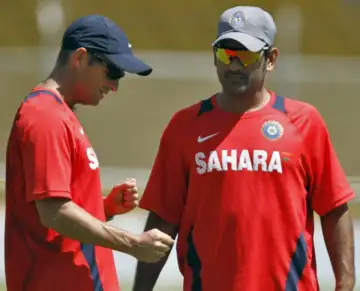
IMAGE: Gary Kirsten speaks with Mahendra Singh Dhoni at a nets session. Photograph: Amit Dave/Reuters
How difficult is it to be coaching across cultures? You played for South Africa, you coached the Indian team, you coached South Africa, and, of course, recently Pakistan.
I don’t think it’s overly difficult. The reason is that cricket’s a common language, so we can always come and have a conversation around the game of cricket and even when we kind of transcend languages, there are words that just come out that are the same.
So, I think that’s the beauty of it, when we talk cricket.
When you do have language difficulties and barriers, there’s always ways and means that you can get a message across.
But let’s be honest: If I’m delivering a team talk and I’m angry about the way we didn’t play to our values on the field or didn’t try hard enough. I can talk in any language.
The players are gonna get me through my body language, so you can cover a lot of bases in cricket communication.
The biggest challenge in working across cultures is just understanding how they think and how they look at the game, and also how they respond to leadership.
And that’s something that I’ve spent a lot of time trying to understand better. For example, the South Africans probably enjoy a lot of collaborative kind of leadership style where they want to feel like a part of the bigger picture.
Whereas I found when I was with some of the Indian teams in the IPL, they wanted a more top-down leadership style where the coach tells us what to do and we’ll go do it.
As you become more experienced as a coach, you learn about those things, you learn how to manage people in different cultures based on what their needs are.
What is the difference for you between managing cricketers and leading them in? How is the approach different? Or is it very similar?
Man management is a crucial component to coaching, if not the most important component. How do you get the best out of a group of people with a common purpose and vision and moving in the same direction? I’ve had a lot of chats with current IPL Champion Coach Andy Flower around this.
It’s just understanding how you take a group of people from a lot of different walks of life and get them to find a common purpose.
And in these short-form tournaments and in the leagues around the world, that can be quite a challenge because you’re there for six, seven weeks.
How do you pull this team together? When you’re coaching a country, there’s a natural motivation. It’s a big thing to be representative of your country. There, I think one’s leadership style is how do you create an environment for the natural motivation that these players already have in representing their country, to create a high performance environment — in, other words, their behaviour on a daily basis would depict a high-performance space.
The way they practice, the way they prepare for matches, the way they look after themselves off the field. That’s you create this high-performance environment around them.
So I’m always fascinated to see in the different places that I’ve coached, what does this group of players need for them to thrive?
And I found from a leadership perspective that can be quite different. And you ask the question around management and leadership, but for me it’s kind of one of the same.
Yes, you have to lead, you have to direct the pace of a group of people to say this is the best for all of us.
I think that’s where your leadership component comes in, and then your management is on a daily basis.
Are you checking in with your players on a daily basis to make sure not only as individuals, but as a team, we moving in the same direction?
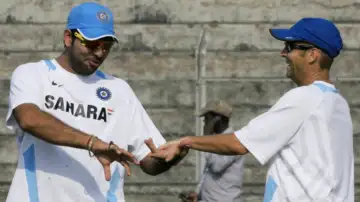
IMAGE: Yuvraj Singh with Gary Kirsten at a nets session in Guwahati, November 27, 2010. Photograph: Rupak De Chowdhuri/Reuters
So was that the philosophy you used when you took over the Indian team, seeing how they’d come off the previous World Cup and all that had happened before?
It was amazing the way you turned it around and were able to get the best out of every player.
How did you pull that off with Team India in 2011?
Well to be fair, the one thing that we can’t discount is that I inherited a really good cricket team, with M S Dhoni as the new captain.
Anil Kumble was actually the captain when I started, but then he retired, shortly afterwards, and then MS took over. He was a mercurial, generational talent as a leader. He just did things that people wanted to follow, and so from that perspective, it was incredible working with him.
And I think we built a good relationship. It took us a while, but eventually we kind of built a really good leadership relationship. I’ll never forget it was in our preparation for the World Cup where we wanted to head down to the Bangalore Air Force Academy to do some training and all the players were pretty excited by it.
We kind of get up to go and then, the security guys asked all the foreigners, which were some of the coaches, for their passports.
And the news came back to say, sorry, we can’t permit some of these coaches to come to the academy, it’s a security breach.
Dhoni just stood up and said, well, we’re canceling the whole event. If they can’t come, we are not coming. And that was a wow. A great indication of where we were as a team at that time.
We were kind of all in, coaches and players. We got on really well with one another. If anything, we created a very happy environment and space.
We enjoyed each other’s company. We had great respect for each other in terms of how we behaved on and off the field. We didn’t always win.
In fact, we lost a one-day series just before the World Cup and we managed ourselves really well in that space. There was massive trust in the environment and through that we were able to overcome adversity.
We were also able to really thrive with a lot of those players playing some of the best cricket that they had played in their lives.
Let’s not forget the Great Sachin was battling a little bit in his career. Before 2007, he wasn’t sure where he was going. He wasn’t that happy. And between 2008 and 2011, he got 18 international hundreds, so that’s a lot of runs in three years, a lot of hundreds.
And Gambhir was the number one-ranked Test player in the world. Zaheer Khan was the number one-ranked bowler in the world at one point.
Sehwag was banging out triple hundreds and doing some incredible things. So there were a lot of guys playing really good cricket during that period.
Once we were flying in formation, that was the biggest challenge, just to get everyone to fly in formation really.
One image that really stuck in our heads is that warm embrace between you and Yuvraj Singh after the World Cup win, and the great story that we discovered later that he was suffering from cancer through the World Cup.
How was it with somebody like that who you really have to manage well and then you have superstars like Sachin that you’re managing.
How does one balance that in a team and still manage to lead and hold your own?
Every one of those players was a leader in their own right.
It was just how can you express your leadership, you know. We were able to create an environment where people felt not scared to talk, talk up and share. So that opportunity was really important.
Sachin from the moment that I got to know him well he was all in about the team. He wanted the team to have success. He’d had a lot of success in his own right.
I was always very fond of Yuvraj. We had this kind of great relationship where like, he used to frustrate the hell out of me sometimes, but I just loved him. He’s was good.
I just want him to be scoring runs all the time because when I watch him bat, it’s just like amazing to watch. But there was a journey he had to walk and credit to Paddy (Paddy Upton, mental conditioning and strategic leadership coach).
Paddy did a lot of work with Yuvi to get him ready for that World Cup. Yuvi himself made some key decisions around getting himself prepared and ready for the World Cup.
Thank goodness we picked him because it was flipping close, he was. It was not a slam dunk selection.
The selectors kind of debated around the 15 players. I was very keen to have him in the team as was Dhoni because of the experience that he brought to the group. And look at the World Cup he ended up having.
So what’s your formula for creating a winning culture within a team? What are your non-negotiables when you’re putting a team together?
Faisal, you’ve gotta work out a way that we can all, or not all of us, but most of us, can thrive in the environment.
I say most of us, because I don’t think everyone will, but for me, my kind of life’s work as a leader, coach is to set up environments that allow for a lot of people to be thriving and succeeding.
Now sometimes you try to do that and you don’t get it right, and that’s happened to me on a number of occasions. But when you do get it right, you see people being able to express their skills and their talents at its optimum.
And when that’s happening, when you get a guy who should be in the top three bowlers in the world delivering on that, it gets very exciting because then everyone becomes a leader in their own right.
So, the key to our World Cup success in 2011 was we probably had, I would say 7, maybe even 8 of the 11 guys that played in that World Cup final that could make a match-winning contribution in the match, in a final.
They had the experience, they had the skills. And they could single-handedly turn the World Cup around.
And when you’ve got a group of players where you’ve got your critical mass up enough where you know that even if you are 35 for three, you can still chase down 280.
Because you know that your five and six are as good as your one, two, and three, or that your number seven can make a massive difference in the outcome of a game.
Or, that your fifth bowler, which is what we had in Yuvi — he actually ended up becoming our fifth bowler in a way because he did so well — when you have that in your team you have that depth of performance.
Produced a great team, but that doesn’t happen overnight. That takes time. It takes continuity and selection. It takes backing players when they’re not playing that well and you move away from crisis management.
Something that I’ve fought long and hard with, selectors and administrators is, you’ve backed me to run this team, let me build some continuity in the programme. But you always get thrown curve balls and crisis management decisions.
I’ve seen this in IPL flat out, it’s just like, you lose two games and let’s change the whole thing here.
And it drives me mad to be honest with you because, you’re trying to back players and believe in them, but then other people wanna just move them on and and let’s get to the next guy. And I don’t like coaching that way.
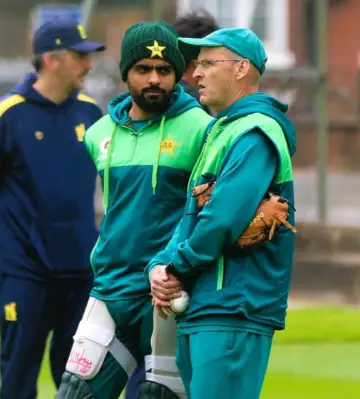
IMAGE: Gary Kirsten with Babar Azam. Photograph: Kind Courtesy PCB/X
You had that same problem with the Pakistan team recently where you weren’t able to run it the way you’d like it to.
I really enjoyed working with the players. It was a very short period of time and cricketers in this world, they’re good guys. They’re good people.
They want to do well in cricket. There’s a lot to learn with each guy. Some take longer than others to understand them and how to get the best out of them. I was with the team for six games.
It’s like it’s not a lot by any stretch, but I was really motivated to get back into an international team again.
I just thought it would be so cool to get involved in an international environment. But if you’ve got massive outside interference it’s never gonna work because if the team’s not winning, there’s always crisis management that comes into place.
So, there was lots of interference and we had to chop and change and, but eventually, I think the straw that broke the camel’s back was when they said to me, you’re not involved in selection anymore.
My job’s to shape a team and to help it be a match-winning team. And if one of the key components to that you’re not involved in then, I didn’t sign up for that.
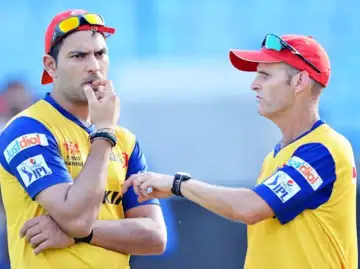
IMAGE: Yuvraj Singh with Gary Kirsten at a training session. Photograph: BCCI
Why is that so important, Gary? I’ve covered cricket and I’ve seen that there’s always been a problem between selectors and the board not wanting to give a seat or a vote to the coach.
Why do you think that’s so important? Why can’t the team that’s given to a coach make the best of what it is?
I’ve never really had a clear idea of that. What role the selector should play is they should give me 20 players.
They should be allowed to select the top 20 players because they have access to the domestic environment and they know exactly who the 20 players are.
But once those 20 players are selected, they must then make a decision, these are the 20 players in white bull cricket that you can use for the next six months until we find someone new. But these are the guys you can work with. So you can choose whoever you want between these 20 players. And then it’s up to the coach and the captain.
We had that with Dhoni. We picked 15 in our squad on a tour, every tour, and I didn’t speak to the selectors after that.
Dhoni and I selected the team and World Cup final. We, Dhoni, myself and a couple of senior players, we selected our final 11.
And that’s the best way. That’s the best way it works because when coaches are working one-on-one with the players and building relationships and spending time developing their skills, to then to have someone from the outside come in and say, sorry, you can’t pick him anymore it is not fair on the coach.
In the end, the coach is the one that’s gonna get fired if the team’s not doing well.
So why can’t I control of the team that I picked?
Give me 20 in the squad because you’ve seen the broader picture. And I’ll come back to you in six months time and say, is there anyone else that you think should be part of the squad? Or is there anyone that we should consider leaving out? And we’ll have a conversation once every six months.
What’s your approach to dealing with conflict within a team? Give us an example to understand how you navigate it through those difficult situations.
Conflict in a team environment’s like conflict in an office space, in a corporate environment, it is no different.
It needs to be well managed. Everyone has a different, style or method.
I prefer not to share personal examples because I don’t want to compromise any individual, but what I can tell you is you get a variety of different experiences.
You’ll have one player it’s quite easy when you leave him out of a team and he just says, I understand. And as long as you are accurate in your reasoning I think every player generally can handle it.
But you will always get the occasion where a player doesn’t agree with a decision that you make, whether it’s a practice that you wanted to call, that he wants to have a rest, whether it’s a guy being left out of a team, whether it’s communication that you’ve heard between a senior and a junior player that’s detrimental to the junior player.
There’s always stuff going on. So you’re not immune to conflict, but if managed well, you can kind of get through a lot of it.
There are always issues along the way. There are always people that think about themselves largely and they think, well, that doesn’t suit me or that doesn’t work for me.
But you as a leader, you’ve gotta make a decision for the better of the team. As a leader, the one thing that I’ve learned is I might not get all the decisions right.
But I’ve gotta stand for what I believe in. So I learned quite early in my teaching career that the most important thing is not whether the decision’s right or wrong, the most important thing is you make a decision.
And I think most people will accept that whether, right or wrong. I don’t think I had huge conflicting moments across my coaching journey.
I’ve had one or two of those — one or two — we still to this day disagree about the decision that was made. But that’s fine, that’s life. And you kind of move on with it.
If it’s to the detriment of what we stand for as a group of people, as a team, then I’m going to hold my ground. I’ll be flexible in most other things.
In other words, if you’ve got a view on why you should be in the team and you’re not being picked, I can accept that.
But if you are disagreeing on a value like punctuality in getting to practice and you’re pushing back on that, then I’m gonna push back hard. So there’s certain non-negotiables around how you operate.
But I think with conflict you’ve gotta be as accurate as possible and be to the point as possible.
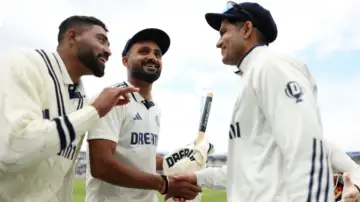
IMAGE: Shubman Gill hails Mohammed Siraj and Akash Deep after India’s landmark victory in the second Test against England at Edgbaston. Photograph: BCCI
You see this new Indian team, these youngsters battling it out in England. Do you ever feel like you’d want to come back and take this new bunch of youngsters and start again, recreate the magic that you did that culminated in the 2011 World Cup final win?
Someone hasn’t asked me that for a long time, but I do. I just have such an affection for Indian cricket. I really do.
And if someone says to me, would you consider having another go if I definitely wouldn’t say no straight out, although I kind of have moved on. But I do have a deep affection for the Indian players and Indian cricket.
It’s been really good to my life. Since 2011, I’ve had a lot of privilege out of leading the 2011 Indian team and the experiences I’ve had since then, the leadership journeys I’ve been on across corporate India actually.
Feature Presentation: Rajesh Alva/Rediff
